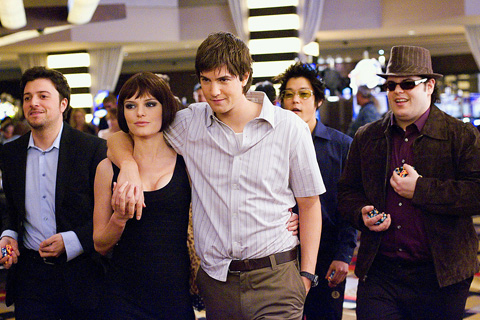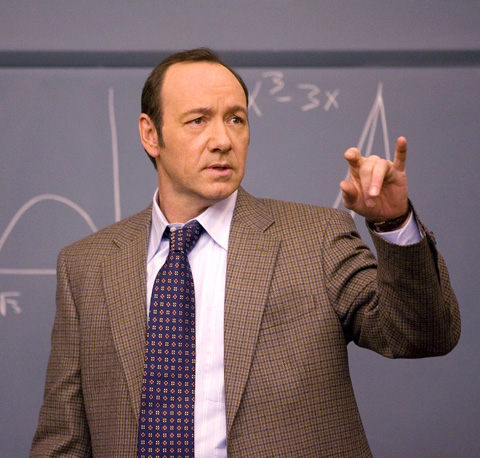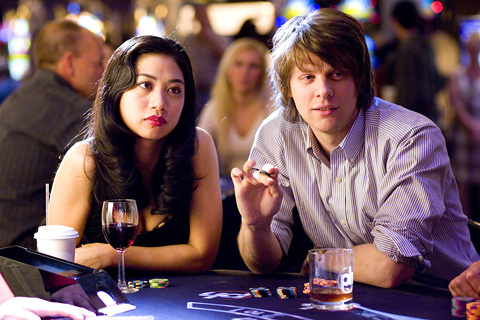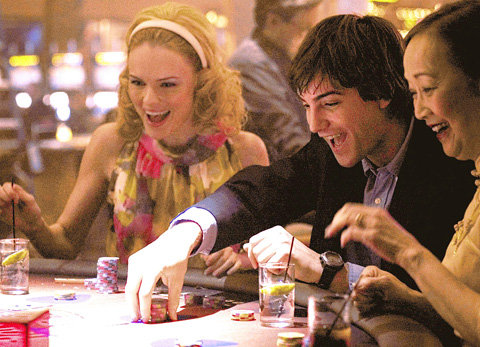If the thrill of gambling were really about winning, there would be too few gamblers to support the multibillion-US dollar Vegas gambling industry. Everybody knows that the odds are predetermined to favor the house, and that people play the games for the rush, not the payoff. Bettors are many; winners are few. That’s what makes it a reliably profitable business. Like insurance. The premiums for participating in the game outweigh the payouts the company makes as incentives to keep the players playing.
So, how exciting would it be if, say, somebody devised a system that used simple math to give a blackjack player the edge over the dealer? 21 is “inspired by” the real-life story of the Massachusetts Institute of Technology (MIT) students who took Las Vegas casinos for millions, but has been reshaped to fit a simple movie template — and it’s nearly as much fun as watching an insurance professional compute actuarial tables.
In 21, the worst thing a gamester can be accused of is gambling. “Don’t give in to your emotions,” MIT professor Micky Rosa tells his blackjack students. “Play the system.” Good advice for a card-counting scheme. Bad advice for a movie. If you want to see how a formatted screenplay looks when it’s actually on the screen (you can just about count the page numbers as they flip by, and maybe measure the margins, too), 21 may provide a practical lesson: How to follow all the “rules” and end up with zero. It’s not unwatchable, but you could watch it with your eyeballs tied behind your back and enjoy it just as much.

PHOTOS COURTESY OF SONY
Here’s another example of a good story turned into a purely generic one — no doubt with the aid of a Bob McKee screenwriting seminar and textbook.
Act I: MIT undergrad Ben Campbell (Jim Sturgess) is a smart-nerd Bostonian white guy working with his best friends (a fat guy and a Persian-American guy) on a project for a robotics competition. He really needs a US$300,000 scholarship to get into Harvard Medical School, but he’s only one of 72 talented prospects. He’s recruited by professor Rosa (Kevin Spacey) to join a secret cabal of card-counters with a scheme to hit Vegas on weekends and make a fortune. He resists. A Beautiful Girl (Kate Bosworth) attempts to woo him. He resists. OK, he really needs the money, so he joins up — but just until he can get the money he needs for school. He learns the blackjack system in a montage sequence or two and passes the test. The Beautiful Girl rebuffs his advances in an attempt to maintain a strictly professional relationship.
Act II: The team goes to Vegas and they win. Another montage sequence? Maybe. It’s getting a little fuzzy. But wait: A casino security guy named Cole Williams (Laurence Fishburne) starts to notice something — and not a moment too soon because he’s losing all his business to high-tech biometric face-recognition software. Technology! Drat! Card-counting isn’t illegal, but the casinos want you to know that if you’re caught doing it, they might take you down in the basement and beat the living craps out of you.

PHOTOS COURTESY OF SONY
The Hard Rock Casino comps Beautiful Girl a suite in which she and Ben enjoy a brief, soft-focus sex-scene montage. “It seemed too good to be true,” Ben says in voice-over. “And it felt like it was never going to end.” It does. Ben is not the same guy he was back in Boston. He loses — money, his friends, the Beautiful Girl, his mentor, everything. Bummer.
Act III: Ben has one last chance. He makes up with Micky and Girl, and the team reunites for one last Big Score in Vegas. Everything works out exactly as the screenwriters have planned. The End.
Meanwhile, British actor Sturgess (Across the Universe, The Other Boleyn Girl) gets to play an American with traces of a peculiar accent (based on Jeff Ma, a Chinese-American who was called Kevin Lewis in the book); Spacey gets to alternate his slick good-cop schtick (LA Confidential) with his steely bad-cop schtick (Swimming With Sharks); director Robert Luketic (Legally Blonde, Monster-in-Law) gets to direct another picture; and Bosworth gets to wear some wigs.

PHOTOS COURTESY OF SONY
Watch for the moment when somebody obviously pulls a punch. If you hadn’t figured out the rest of the movie by then, it gives away the whole thing.

PHOTOS COURTESY OF SONY

PHOTOS COURTESY OF SONY

Following the shock complete failure of all the recall votes against Chinese Nationalist Party (KMT) lawmakers on July 26, pan-blue supporters and the Chinese Communist Party (CCP) were giddy with victory. A notable exception was KMT Chairman Eric Chu (朱立倫), who knew better. At a press conference on July 29, he bowed deeply in gratitude to the voters and said the recalls were “not about which party won or lost, but were a great victory for the Taiwanese voters.” The entire recall process was a disaster for both the KMT and the Democratic Progressive Party (DPP). The only bright spot for

As last month dawned, the Democratic Progressive Party (DPP) was in a good position. The recall campaigns had strong momentum, polling showed many Chinese Nationalist Party (KMT) lawmakers at risk of recall and even the KMT was bracing for losing seats while facing a tsunami of voter fraud investigations. Polling pointed to some of the recalls being a lock for victory. Though in most districts the majority was against recalling their lawmaker, among voters “definitely” planning to vote, there were double-digit margins in favor of recall in at least five districts, with three districts near or above 20 percent in

From Godzilla’s fiery atomic breath to post-apocalyptic anime and harrowing depictions of radiation sickness, the influence of the nuclear bombings of Hiroshima and Nagasaki runs deep in Japanese popular culture. In the 80 years since the World War II attacks, stories of destruction and mutation have been fused with fears around natural disasters and, more recently, the Fukushima crisis. Classic manga and anime series Astro Boy is called “Mighty Atom” in Japanese, while city-leveling explosions loom large in other titles such as Akira, Neon Genesis Evangelion and Attack on Titan. “Living through tremendous pain” and overcoming trauma is a recurrent theme in Japan’s

The great number of islands that make up the Penghu archipelago make it a fascinating place to come back and explore again and again. On your next trip to Penghu, why not get off the beaten path and explore a lesser-traveled outlying island? Jibei Island (吉貝嶼) in Baisha Township (白沙鄉) is a popular destination for its long white sand beach and water activities. However, three other permanently inhabited islands in the township put a unique spin on the traditional Penghu charm, making them great destinations for the curious tourist: Yuanbeiyu (員貝嶼), Niaoyu (鳥嶼) and Dacangyu (大倉嶼). YUANBEIYU Citou Wharf (岐頭碼頭) connects the mainland